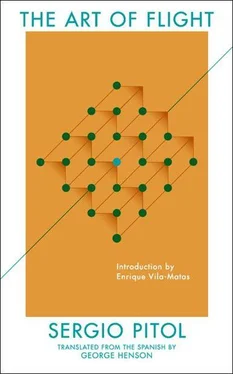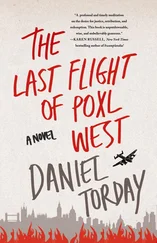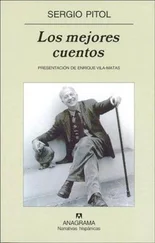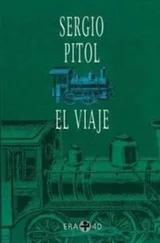Sergio Pitol - The Art of Flight
Здесь есть возможность читать онлайн «Sergio Pitol - The Art of Flight» весь текст электронной книги совершенно бесплатно (целиком полную версию без сокращений). В некоторых случаях можно слушать аудио, скачать через торрент в формате fb2 и присутствует краткое содержание. Год выпуска: 2015, Издательство: Deep Vellum, Жанр: Современная проза, на английском языке. Описание произведения, (предисловие) а так же отзывы посетителей доступны на портале библиотеки ЛибКат.
- Название:The Art of Flight
- Автор:
- Издательство:Deep Vellum
- Жанр:
- Год:2015
- ISBN:нет данных
- Рейтинг книги:5 / 5. Голосов: 1
-
Избранное:Добавить в избранное
- Отзывы:
-
Ваша оценка:
- 100
- 1
- 2
- 3
- 4
- 5
The Art of Flight: краткое содержание, описание и аннотация
Предлагаем к чтению аннотацию, описание, краткое содержание или предисловие (зависит от того, что написал сам автор книги «The Art of Flight»). Если вы не нашли необходимую информацию о книге — напишите в комментариях, мы постараемся отыскать её.
The first work in Pitol's "Trilogy of Memory," The Art of Flight imaginatively blends the genres of fiction and memoir in a Borgesian swirl of contemplation and mystery, expanding our understanding and appreciation of what literature can be and what it can do.
The Art of Flight — читать онлайн бесплатно полную книгу (весь текст) целиком
Ниже представлен текст книги, разбитый по страницам. Система сохранения места последней прочитанной страницы, позволяет с удобством читать онлайн бесплатно книгу «The Art of Flight», без необходимости каждый раз заново искать на чём Вы остановились. Поставьте закладку, и сможете в любой момент перейти на страницу, на которой закончили чтение.
Интервал:
Закладка:
I breathed a sigh of relief. At that moment, I realized that we had all stopped talking. What was curious was that the three of us, Hugo and I from the beginning of the old man’s march, and Monsiváis from the time he walked by the table, thought that he was a friend from our youth whom we were not able to place. Perhaps an actor from our generation, a young leading man with a brief but intense career, retired from the profession many years ago. But that possibility turned out to be, without our knowing why, unconvincing.
We devoured our dessert and downed our coffee, as if trying to escape that character who was so close to us. The suspicion that someone could at that very moment be saying the same thing about us made us a little uneasy to say the least. In short, one must grow accustomed to such discomfort upon reaching a certain age.
EVERYTHING IS ALL THINGS
After the first “vision,” I returned to Venice at least a dozen times. I have wandered every corner of it, and read with interest and pleasure many of the texts that have been written about it, its history, its art, and its customs. There also exists a store of fiction set in Venice. In almost every one of these novels it is considered more than just a setting; rather, it becomes a character. Sometimes it is the protagonist itself.
Puritans, by training, by creed, or by temperament, tend to demonize it; in some, the rejection coincides with an irresistible attraction, and that duality is transformed into delirium. Ruskin passionately described each of its stones, and at the same time was horrified by the customs and traditions of its inhabitants. Evil dwells in the heart of Venice; it is a sea of abomination; its contaminating power is the work of the devil, they say. Should an innocent person manage to escape from there, he does so with a damaged soul. Some are even denied that privilege. They succumb; such is the case of Aschenbach from Death in Venice . Half of mankind allows itself to berate it, lecture it; they attempt to reform it, redeem it from its sins and vices; they demand it cease to exist in order to purge its sins; they rejoice in its decline; only its sinking — death by water — will succeed in purifying it.
Its defenders at times employ disconcerting arguments. Berenson becomes rhapsodic over its colors. He marvels at its extraordinary school of painting, the only one in Italy that lacks “primitives,” because it was born with a handful of masterpieces. The celebrated aesthete asserts that Venice was the first modern European nation, but the reasons underlying this assertion seem rather paradoxical: “Since there was little room for personal glory in Venice, the perpetuators of glory, the Humanists, found at first scant encouragement there, and the Venetians were saved from that absorption in archeology and pure science which overwhelmed Florence at an early date. […] As it was, the feeling for beauty was not hindered in its natural development.” Venetian painting is created, and he insists on this point at various times, to be simply an object of pleasure.
What Berenson highlights — his admiration for beautiful and healthy bodies; his love for colorful and sumptuous decoration; the disposition toward pleasure, carnival; the permanent use of the mask and erotic extravagance — is what scandalizes Puritans. On the other hand, anyone who has the slightest propensity for sensuality will in La Serenissima feel as if he were in the Temple of Venus. It is no wonder Casanova is known world-over as the son of Venice.
Venice is boundless and unfathomable. There is always something to see on the next trip, because a church is under restoration, a painting is on loan, the museums are on strike, a thousand reasons. Each trip means corrections, amplifications, surprises, dedications, and demystifications. During my first trips Longhi did not even exist for me, yet today he is one of the painters I am most drawn to. I waited many long years to be able to see Carpaccio’s amazing mural St. George and the Dragon . For many years, time and again, I walked the long route from La Fenice et des Artistes hotel, where I always stay, to the church of San Giorgio degli Schiavoni, and each time I encountered an unexpected obstacle: closed for restoration, admission denied due to some special ceremony, the walls draped in thick curtains without any explanation whatsoever. During my last trip, when I was finally able to see that and the other frescoes the San Giorgio holds, I felt as if I had at long last planted a pike in Flanders.
The first time, it bears repeating, I saw the city without seeing it. Instead I saw it in fragments, emerging and disappearing, with incorrect proportions and altered colors. The spectacle was at once unreal and marvelous. Over the years I have corrected that vision, each time more magnificent, each time more unreal. In some way my travels around the world, my entire life, have had that same character. With or without glasses, I’ve never achieved more than glimpses, approximations, mutterings in search of meaning in the narrow space that runs between light and darkness. I’ve dreamt that I was a voyager in that fantastic ship of fools painted by Memling, which I once contemplated with amazement in the Naval Museum of Gdansk. What are we, and what is the universe? What are we in the universe? These are questions that leave us speechless, and that we are accustomed to answering with a joke so as not to seem ridiculous.
We, I would venture to guess, are the books we have read, the paintings we have seen, the music we have heard and forgotten, the streets we have walked. We are our childhood, our family, some friends, a few loves, more than a few disappointments. A sum reduced by infinite subtractions. We are shaped by different times, hobbies, and creeds. As I write these pages, I can divide my life into one long, enjoyable, gregarious phase, and another, the most recent, in which solitude seems to me a gift from the gods. For many years, going to parties, lunches, tertulias , cafés, bars, restaurants was a daily pleasure. The transition to the other extreme occurred so gradually I’m unable to explain the process’s distinct movements. My years in Prague coincided with an intense inner energy. Writing became an obsession; I believe the unbearable social life that I was obliged to lead, for reasons of protocol, in some way nourished the novels I wrote there with anecdotes, episodes, gestures, phrases, and habits.
I live in Xalapa, a provincial capital surrounded by exceptional landscapes. In the morning I go out to the countryside, where I have a cabin, and I spend several hours writing and listening to music. From time to time I take a break to play with my dog in the garden. I return to the city for the midday meal, and in the afternoon I write again, listen to music, read, and sometimes I watch an old movie on videocassette. I talk to friends on the phone. After six p.m., except on rare occasions, nothing can make me leave the house. I am indebted to the architect Bernal Lascuráin, to his imagination, to his taste and his talent, for the pleasure of inhabiting these houses, each one built as a complement to the other. If I had to live under house arrest in them, I would be perfectly happy. I work until two or three in the morning. That rhythm of life which others might find maddening is the only one that appeals to me.
Those things of importance that happen to us in life are due to instinct, Julien Green says. “All sexualities are a part of the same family: instinct. But there is something in it that always escapes us, of which we are conscious. It is what makes our life exciting. Every human being carries a mystery of which he is unaware.” What doesn’t matter, I suppose, what is the same for everyone in the world, what makes an epoch trivial, is created naturally by society. We condition ourselves to it without realizing it; that is one of its great labors and the source of a thousand misfortunes. But then one believes he is behaving like a robot, acting mechanically, marching like a sleepwalker, like an army of tiny little men, and, in the end, it turns out that the force of instinct has worked in the opposite direction. As a child Rosita Gómez dreamt of being a stripper and ended up being an honest bank teller; she never learned to dance, not even waltzes. Marcelino Góngora dreamt of being in the mafia, the head of a criminal gang, the terror of the underworld, yet before the end of adolescence he was a sacristan in his village church. The book that someone intended to write, and for which he took countless notes for years, suddenly came to a standstill, ceased to be a project; something unexpected, beyond his control, began to take shape. That’s how things work. Ask again what we are, where we are going, and a fist in the mouth will rid you of the few teeth you have left.
Читать дальшеИнтервал:
Закладка:
Похожие книги на «The Art of Flight»
Представляем Вашему вниманию похожие книги на «The Art of Flight» списком для выбора. Мы отобрали схожую по названию и смыслу литературу в надежде предоставить читателям больше вариантов отыскать новые, интересные, ещё непрочитанные произведения.
Обсуждение, отзывы о книге «The Art of Flight» и просто собственные мнения читателей. Оставьте ваши комментарии, напишите, что Вы думаете о произведении, его смысле или главных героях. Укажите что конкретно понравилось, а что нет, и почему Вы так считаете.












